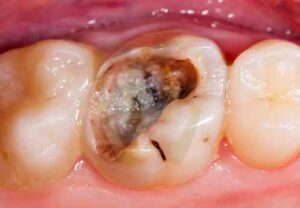Welcome to our comprehensive guide on fixing rotted teeth. Dental health is essential not only for a beautiful smile but also for overall well-being. Rotted or decayed teeth can cause discomfort, pain, and impact your ability to eat and speak. In this article, we’ll dive deep into the causes of rotted teeth, preventive measures, and various treatment options available to restore your smile. Whether you’re experiencing minor decay or severe dental issues, this guide will provide you with the knowledge you need to take control of your oral health.
Fixing Rotted Teeth: Understanding the Problem
To address the issue of fixing rotted teeth, it’s crucial to first understand what causes the decay. Decay occurs due to the buildup of plaque on the teeth, which produces acids that erode the enamel, leading to cavities. Neglecting oral hygiene, consuming sugary foods, and avoiding regular dental check-ups are common contributors to rotted teeth. Additionally, certain medical conditions and medications can also increase the risk of tooth decay.
The Importance of Dental Hygiene in Preventing Rotted Teeth
Maintaining good oral hygiene is the first step in preventing rotted teeth. Brushing your teeth twice a day, flossing regularly, and using mouthwash can help remove plaque and bacteria, reducing the chances of decay. Visiting your dentist for routine check-ups and cleanings is also vital to catch any potential issues early on. Remember, prevention is always better than cure when it comes to dental problems.
Common Symptoms of Rotted Teeth
Rotted teeth can manifest various symptoms, indicating the need for prompt dental attention. Some common signs include tooth sensitivity, persistent bad breath, toothache, visible holes or pits in the teeth, and dark spots or staining on the tooth surface. If you notice any of these signs, it’s crucial to consult a dentist to determine the extent of decay and explore suitable treatment options.

Treatment Options for Fixing Rotted Teeth
1. Dental Fillings: For minor to moderate decay, dental fillings are an effective treatment. The decayed portion of the tooth is removed, and the cavity is filled with materials like composite resin, amalgam, or gold. This prevents further decay and restores the tooth’s function.
2. Dental Crowns: In cases of significant decay or weakened teeth, dental crowns provide a durable and protective solution. The decayed part is removed, and a custom-made crown is placed over the tooth, restoring its shape, strength, and appearance.
3. Root Canal Therapy: When decay reaches the tooth’s pulp, it can cause severe pain and infection. Root canal therapy involves removing the infected pulp, cleaning the root canals, and sealing them with a filling material. This saves the natural tooth and eliminates the infection.
4. Extraction and Dental Implants: In extreme cases where the tooth cannot be saved, extraction may be necessary. Dental implants can then be used to replace the missing tooth, providing a permanent and natural-looking solution.
5. Dental Bonding: Dental bonding is a cosmetic procedure used to repair minor decay or chips in the teeth. A tooth-colored resin is applied to the affected area and hardened with a special light, bonding it to the tooth surface.
Preventing Rotted Teeth: Best Practices for Oral Health
Prevention is the key to avoiding the hassle of fixing rotted teeth. Follow these best practices to maintain excellent oral health and reduce the risk of tooth decay:
– Limit Sugary Foods: Minimize your intake of sugary snacks and beverages, as they contribute to plaque buildup and tooth decay.
– Regular Dental Check-ups: Visit your dentist at least every six months for check-ups and professional cleanings.
– Fluoride Toothpaste: Use toothpaste with fluoride to strengthen enamel and protect against cavities.
– Balanced Diet: Eat a balanced diet rich in vitamins and minerals, promoting strong teeth and healthy gums.
– Avoid Tobacco and Alcohol: These substances can harm your oral health, leading to tooth decay and gum disease.
Frequently Asked Questions (FAQs)
Can fixing rotted teeth be painful?
The level of pain experienced during dental treatments varies depending on the severity of the decay and the procedure performed. Dentists use anesthesia to minimize discomfort during treatments, and post-treatment pain can often be managed with over-the-counter pain relievers.
How can I know if I have rotted teeth?
Common signs of rotted teeth include tooth sensitivity, toothache, visible holes or pits in the teeth, and dark spots or staining. Regular dental check-ups can help detect decay early before it becomes a significant issue.
Are there natural remedies for fixing rotted teeth?
While some home remedies claim to treat rotted teeth, they are not a substitute for professional dental care. Consulting a dentist and following their recommended treatments is essential for effectively fixing rotted teeth.
Can I prevent rotted teeth if I have a genetic predisposition?
While genetics can influence your susceptibility to dental issues, maintaining good oral hygiene and adopting preventive measures can significantly reduce the risk of rotted teeth.
How much does fixing rotted teeth cost?
The cost of fixing rotted teeth varies depending on the extent of decay and the chosen treatment option. Dental fillings are generally more affordable than dental crowns or implants. Dental insurance may cover part of the cost, so it’s best to check with your provider.
Is fixing rotted teeth covered by dental insurance?
Many dental insurance plans cover procedures for fixing rotted teeth, such as fillings and root canals. However, coverage can vary, so it’s essential to review your policy or speak with your insurance provider to understand your specific coverage.
Maintaining good oral hygiene, attending regular dental check-ups, and promptly addressing any dental issues are crucial steps in preventing and fixing rotted teeth. Remember that prevention is more cost-effective and less painful than waiting for a severe dental problem to arise. By following the best practices outlined in this guide, you can keep your teeth healthy and enjoy a confident smile for years to come.



